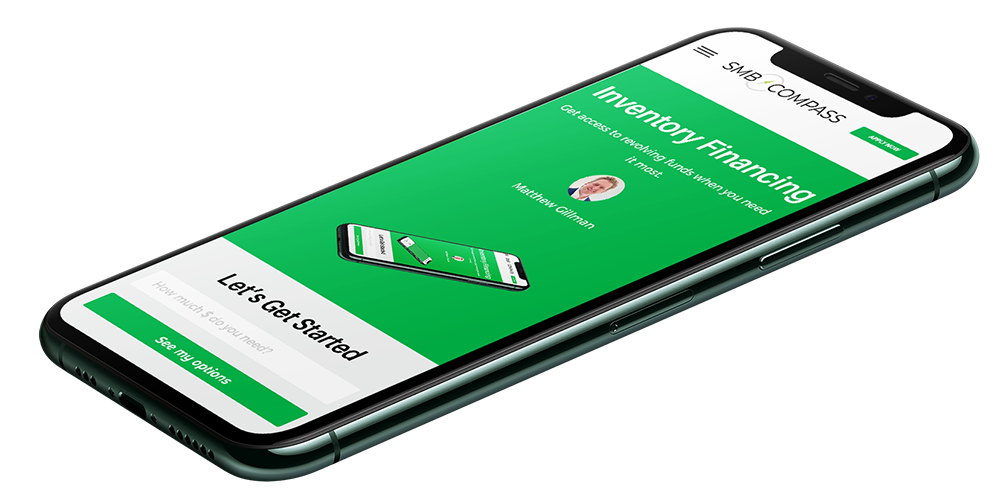Table of Contents
Key Takeaways
- Inventory financing uses your company’s unsold inventory as collateral for the loan. The amount of money you can borrow depends on your industry, type of inventory, and inventory churn.
- The most common types of inventory used are raw materials, works in progress (WIP), and finished goods.
- The more liquid your inventory, the higher your loan-to-value ratio. This means that the easier it is for lenders to sell your inventory, the higher its value. Raw materials are one of the easiest to liquidate, making them an appealing form of inventory for financial institutions
What is Inventory Financing?
Inventory financing lets you leverage existing inventory to secure additional working capital. It’s often used by companies with large quantities of inventory, like wholesalers, retailers, construction, etc.
There are two main structures:
Inventory Term Loan: Similar to a business loan, you get a lump sum upfront to purchase inventory. You repay over a fixed term with interest (weekly, bi-monthly, or monthly payments).
Inventory Line of Credit: This functions like a credit card. You access funds as needed up to a credit limit and repay with interest within a timeframe. It offers more flexibility.
The amount of money you can qualify for is primarily based on the percentage of the total inventory value to be put up as collateral, and this depends on the following factors:
Your industry
Type of inventory used as collateral
Inventory churn
You can use the funds for almost any business purpose, including preparing for the peak season, expanding product lines, or unlocking capital tied to unsold or unused inventory.
The Best Inventory Financing Loans
-
Inventory Term Loans
Inventory term loans operate similarly to traditional business term loans. When you get an inventory term loan, you receive a lump sum from the lender. This amount is predetermined based on your inventory’s value and business needs.
Like any loan, you need to repay this sum along with accrued interest. The repayment schedule typically occurs weekly, bimonthly, or monthly. This predictable schedule allows you to budget effectively and manage your cash flow efficiently. With clear repayment terms in place, you can focus on using the funds to optimize your inventory and grow your business.
-
Inventory Line of Credit
An inventory line of credit offers greater flexibility compared to term loans. Instead of receiving a lump sum upfront, lenders provide a revolving credit line where you can withdraw funds as needed, providing immediate access to capital. You’re only charged interest on the funds you use. The credit line replenishes as you repay the drawn amounts within the specified time frame.
Whether you need to restock inventory, cover operational costs, or seize growth opportunities, the inventory line of credit lets you act quickly. This financing option provides the agility you need to go through fluctuations in inventory demand and stay competitive in your industry.
Ready to apply for Inventory Financing?
How Does Inventory Financing Work?
Your lender will conduct field audits and inventory valuations as a part of the funding process. This process determines the final approval and loan amount of your inventory loan or line of credit.
During the field audit, the lender will visit the location of the inventory to evaluate the value of the collateral used to secure the funds. This audit will determine how much money you can borrow against your inventory. This is usually based on how much they could sell the inventory in case of a default.
After the reports are received, and the final approval is issued, you may be able to borrow up to 80% of the appraised value of the inventory.
You will receive a term sheet that outlines the inventory loan amount, the advance rate, the interest rate, and other associated fees. If you accept the terms and sign the sheet, you will need to make a deposit for the field audit and diligence.
You can get $25,000 to $10,000,000, and you’ll receive the money within 24 to 48 hours after approval.
The Types of Inventory Used
The most common types of inventory are raw materials, works in progress (WIP), and finished goods.
These types of inventory have value, but for lenders, some are more valuable than others. The rule of thumb is that the more liquid your inventory is, the higher your loan-to-value (LTV) ratio. Lenders will sell the inventory you placed as collateral if you cannot repay the loan. The easier it is for them to sell it, the higher its value.
Raw materials are generally very easy to liquidate, making this type of collateral appealing to banks and online lenders. As long as there is a market for the sale of the inventory products, finished goods inventory is ideal.
However, work in progress or WIP inventory is usually less valuable to inventory financing lenders. They’re often sold for just the melt-down or material value of the products, which could be valued at only pennies on the dollar, depending on the type of product.
Why You Should Apply for Inventory Financing
-
Meet Customer Demand
Your business may run critically low on inventory or run out of stock during peak season. As you try to build your business as a small business owner, the last thing you want is to disappoint potential customers. You can quickly meet customer demand and keep your business running by leveraging your unsold inventory instead of your personal assets to secure additional working capital. -
Personal Collateral is Not Required
Conventional financing options often require you to submit personal assets as collateral. If this is the case, the risk of losing your home, car, or other personal property is higher. An inventory loan does not require you to put up additional collateral apart from your inventory. If you default on the loan, lenders will only repossess your inventory rather than your personal property. -
Unlock the Working Capital Tied to Unsold Inventory
Small business owners have many day-to-day expenses to address. It can be challenging to move your business forward when a huge chunk of your capital is tied up in unsold inventory. An inventory loan can help you unlock the working capital tied up to your inventory so you can improve your cash flow. By capitalizing on a small business inventory loan, other funding options and credit lines remain open and available for future use. -
Can be Structured as a Revolving Line of Credit
In a revolving line of credit, the principal and interest payments are due when inventory churns and you can access the funds as needed. As payments are made on the loan balance, your credit goes back up. Having an inventory line of credit allows you to access working capital and only pay the amount you’ve drawn, plus interest.
Ready to apply for Inventory Financing?
Are You Eligible for Inventory Financing?
The eligibility requirements may vary from lender to lender. But generally, your business should meet the following requirements to qualify:
-
Sales History
One factor lenders consider is your business’s previous financial and inventory records. To expedite the underwriting process, we recommend you prepare a comprehensive sales history report, including inventory turnover, sales projections, and profitability. Your sales history shows lenders your capacity to repay the inventory loan. -
At Least a Year in Business
The longer you’ve been in business, the higher your chances of approval because lenders will be able to see a more comprehensive sales history. If you’re running a start-up, it’s best to look for other ways to secure funding. -
Lenders will want to know more about your inventory management system, particularly inventory control and movement. Prepare a detailed report outlining the shipping and product returns, sale order receipts, and other factors concerning monitoring your merchandise.
Are You Eligible for Inventory Financing?
If you want to apply for inventory financing, here’s what you’ll generally need to qualify:
- 1+ years in business
- Minimum $20k/mo in revenue
- Minimum credit score of 650 or higher
- One-page application
- 3 months of bank statements
Inventory financing can be a good option, but different lenders do have different requirements. It’s important to understand everything before signing the dotted line.
Here at AB Funding, we make it easy. Instead of a long list of qualifications, we consider a few key things: your business type, annual sales, personal and business credit history, and length of time in business. We specialize in small business financing and can find a solution that works for you, even if your credit or cash flow isn’t perfect. Our goal is to get you the financing you need to grow your business quickly and smoothly.
Ready to apply for Inventory Financing?
How To Apply for an Inventory Financing Loan
Here’s how to easily apply for inventory financing with us:
1. Quick Online Application
Fill out our secure online form. It asks basic things about your business like name, location, and recent income. We’ll also need some personal info to understand your finances.
2. Simple and Secure Uploads
Don’t worry about tons of paperwork! Just upload a few key documents like recent bank statements or tax returns. We only ask for what’s needed for smooth approval.
3. Fast Decision
We know waiting is frustrating, so we prioritize quick approvals. This means you can get moving on your business goals faster.
4. Get Your Money Quickly
Once approved, finalizing the loan agreement and providing any remaining information is easy. We’ll deposit the funds into your account as soon as possible so you can use them right away.
Ready to apply for Inventory Financing?
Invoice Other Financing Options to Check Out
If you’re still on the fence about inventory financing, here are some alternatives you should check out:
-
Invoice Financing
Invoice financing or invoice factoring is an excellent option for companies in the B2B landscape experiencing cash flow gaps due to unpaid invoices. This type of financing, called accounts receivable financing, allows you to receive working capital upfront by using your invoices as collateral.
Lenders usually advance 80% to 90% of the total invoice value, and you’ll receive the remaining percentage (minus fees) once your customers pay their balances. With invoice financing, you don’t have to wait for months to receive invoice payments. -
Short-Term Loans
A short-term loan is, as its name suggests – a term loan with shorter repayment terms. Instead of the usual one to two years, these loans have terms as short as two to three months. It’s best for short-term business expenses but can also be used for any business purpose.
With short repayment terms, businesses with poor credit may have a better chance of approval. Many online lenders offer short-term loans, making it a great option for small businesses that need fast cash. -
Purchase Order Financing
PO financing gives you the working capital needed to pay your suppliers and fulfill large customer orders. The lender will pay your suppliers directly to manufacture and deliver the goods to your customers. Your customers will pay their dues to the lender, who will deduct a small fee before sending the money to you.
PO financing ensures you don’t have to turn down large customer orders. However, this only applies to companies that sell completed products, so businesses that sell services or materials cannot qualify. -
Business Lines of Credit
A business line of credit is a flexible financing solution that provides easily accessible capital. You’ll receive a line of credit from lenders, and you can withdraw from it anytime, given that you don’t exceed the limit. You only have to repay the amount you’ve withdrawn, plus interest. This versatility is beneficial for small businesses, especially since they could use the funds for any business need.
Ready to apply for Inventory Financing?
Apply for Inventory FinancingToday! Your Business?
If you apply through an online lender like AB Funding, we’ll send your application to several lenders so you can choose which one works best for your business.
The lenders we work with are more lenient than most traditional financial institutions, opening up more financing opportunities for small businesses.
Give us a call today at 888-853-8922 or send us an email at info@abfundingusa.com.
Ready to apply for Invoice Financing?
Apply for Invoice Financing Today!
We make it easier for you to secure the funding you need to grow your business. See how much you can borrow.
Applying is free, and it won’t hurt your credit score.
Our financial advisors will get in touch with you to discuss your options at no cost or commitment on your part.
You can also call us at 888-853-8922 or email us at info@abfundingusa.com
Ready to apply for Invoice Financing?





